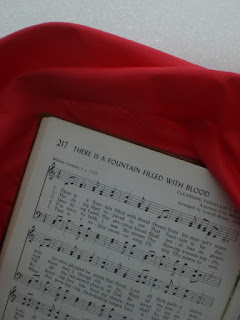 |
| Buds are emerging on our rose stems, but oh, the thorns! |
Why is life at times so
thorny? I’ve asked myself that many times in the past few years—and not
just during my spring rose-pruning duties. Thorny problems and relationships
are part of our sin-filled world. We usually complain about them. But I was
recently reminded of the better perspective expressed by Dr. George Matheson
(1842-1906), a renowned Scottish preacher who endured life blind:
My God, I have never
thanked Thee for my thorn. I have
thanked thee a thousand times for my roses, but not once for my thorn. I have been looking forward to a world where
I shall get compensated for my cross, but I have never thought of my cross as
itself a present glory. Teach me the value
of my thorn.
Of course, any reference to a “spiritual thorn” leads inevitably
to Paul’s use of that term. At some time (perhaps when nearly stoned to death?)
he had a vision of Heaven, too wonderful to express in earthly terms.
But to keep me from
getting puffed up, I was given a thorn in my flesh, a messenger from Satan to torment
me and keep me from getting proud. Three
different times I begged the Lord to take it away. Each time he said, “My
gracious favor is all you need. My power
works best in your weakness.” So now I am glad to boast about my
weaknesses, so that the power of Christ may work through me. Since I know it is
all for Christ’s good, I am quite content with my weaknesses and with insults,
hardships, persecutions, and calamities. For when I am weak, then I am strong.
(2 Corinthians 12:7b-10 NLT)
What was the thorn?
Nobody knows. Some ideas:
malaria, epilepsy, an eye disease (inferred from Galatians 4:13-15). Whatever,
it was chronic and debilitating, interfering with his ministry. Its presence
kept Paul humble and dependent on God to just get through the day. Somehow, seeing Paul’s strength in weakness
inspired those around him who had their own version of a disabling “thorn.”
And these lessons still apply. We’re tempted to rely on our
own cleverness or abilities to get by in life. But when we’re faced with our
true selves, we have a choice: curl up and complain, or trust God for His will in His time.
I sense that lesson in Dr. Matheson. When he aspired to
become a pastor—just as his sight was going—naysayers probably suggested it
wouldn’t work out. But God provided a way through his devoted sister, who
herself learned Greek, Latin and Hebrew to help him in his theological studies.
Throughout his life she helped with his pastoral and calling duties.
Most hymnals still include “O Love That Wilt Not Let Me Go,”
whose lyrics came to him with such fluency and speed one night that he
attributed it to “a dayspring from on high”—the Lord’s inspiration. The key words of its four verses are “love,” “light,”
“joy,” “cross.” All remind me of the Lord Jesus, the One who showed us God’s love.
Who called Himself the “Light
of the World.” And who, “for the joy set before him endured the cross, scorning its shame, and sat down
at the right hand of the throne of God” (Hebrews 12:2 NIV).
All because of a Love that will not let us go.
He is risen! He is risen indeed!


